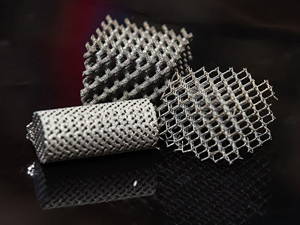



Date:08/04/19
 Chinese scientists have developed a fully bioabsorbable capacitor as an energy storage unit, which can be used for powering implantable medical electronics.
Chinese scientists have developed a fully bioabsorbable capacitor as an energy storage unit, which can be used for powering implantable medical electronics.
Biodegradable electronic devices can be fully or partly degraded in biofluid and environmental water. They can be used in implantable medical diagnoses and therapy, avoiding side effects caused by long-term implantation and second operations. They can also serve portable consumer electronics, which achieve self-degradation after being discarded and avoid high collection costs.
For biodegradable electronic devices, the biodegradable power source is an indispensable part of realizing normal operation. However, research about energy supply for biodegradable implantable electronics is very limited.
Scientists from the Beijing Institute of Nanoenergy and Nanosystems under the Chinese Academy of Sciences (CAS) as well as Beihang University have developed a fully bioabsorbable capacitor that can act as a power source for implantable medical electronic devices.
The capacitor is 1.5 centimeters long, 1.5 centimeters wide and one millimeter high. Experiments on mice showed that it can be implanted underneath the skin and work normally in vivo for 50 days. It can achieve a high voltage window of 1.5 volts, and 70 percent of its capacitance was kept after 3,000 charging cycles.
After it reaches its work limit, it can be decomposed and absorbed by the body without surgical removal.
According to Li Hu, one of the researchers, the bioabsorbable capacitor provides a feasible solution for powering biodegradable implantable electronics in the future. It can be applied as a power source for implantable medical devices to achieve effective treatment of relevant diseases without side effects.
Li said the performance of the bioabsorbable capacitor is world-leading with regard to its biocompatibility, work time, operation voltage and capacitance retention.
"We are also trying to further improve its capacitance to satisfy the specific power requirements of implantable medical devices, " Li said.
The research was published as cover research in the journal Advanced Science.
Chinese scientists develop bioabsorbable power source for implantable medical electronics
 Chinese scientists have developed a fully bioabsorbable capacitor as an energy storage unit, which can be used for powering implantable medical electronics.
Chinese scientists have developed a fully bioabsorbable capacitor as an energy storage unit, which can be used for powering implantable medical electronics.Biodegradable electronic devices can be fully or partly degraded in biofluid and environmental water. They can be used in implantable medical diagnoses and therapy, avoiding side effects caused by long-term implantation and second operations. They can also serve portable consumer electronics, which achieve self-degradation after being discarded and avoid high collection costs.
For biodegradable electronic devices, the biodegradable power source is an indispensable part of realizing normal operation. However, research about energy supply for biodegradable implantable electronics is very limited.
Scientists from the Beijing Institute of Nanoenergy and Nanosystems under the Chinese Academy of Sciences (CAS) as well as Beihang University have developed a fully bioabsorbable capacitor that can act as a power source for implantable medical electronic devices.
The capacitor is 1.5 centimeters long, 1.5 centimeters wide and one millimeter high. Experiments on mice showed that it can be implanted underneath the skin and work normally in vivo for 50 days. It can achieve a high voltage window of 1.5 volts, and 70 percent of its capacitance was kept after 3,000 charging cycles.
After it reaches its work limit, it can be decomposed and absorbed by the body without surgical removal.
According to Li Hu, one of the researchers, the bioabsorbable capacitor provides a feasible solution for powering biodegradable implantable electronics in the future. It can be applied as a power source for implantable medical devices to achieve effective treatment of relevant diseases without side effects.
Li said the performance of the bioabsorbable capacitor is world-leading with regard to its biocompatibility, work time, operation voltage and capacitance retention.
"We are also trying to further improve its capacitance to satisfy the specific power requirements of implantable medical devices, " Li said.
The research was published as cover research in the journal Advanced Science.
Views: 480
©ictnews.az. All rights reserved.Similar news
- Azerbaijani project to monitor disease via mobile phones
- Innovative educational system to be improved under presidential decree
- NTRC prolongs license of two TV and radio organizations for 6 years
- Azerbaijan establishes e-registry for medicines
- Azerbaijani museum introduces e-guide
- Nar Mobile opens “Nar Dunyasi” sales and service center in Siyazan city
- International conference on custom electronic services held in Baku
- OIC secretary general to attend COMSTECH meeting in Baku
- Azerbaijan develops earthquake warning system
- New law to regulate transition to digital broadcasting in Azerbaijan
- Azerbaijani State Social Protection Fund introduces electronic digital signature
- Intellectual traffic management system in Baku to be commissioned in December
- Tax Ministry of Azerbaijan started receiving video-addresses
- World Bank recommends Azerbaijan to speed up e-service introduction in real estate
- Azerbaijan to shift to electronic registration of real estate





















